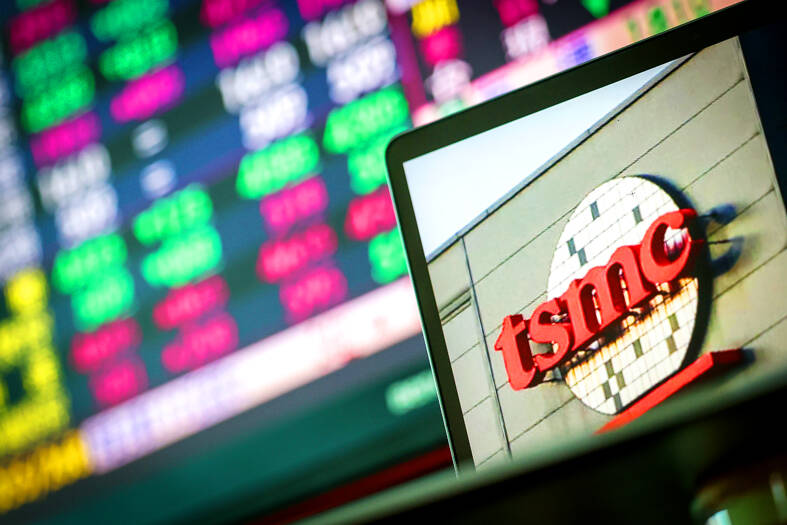The entry of chip giant Taiwan Semiconductor Manufacturing Co (TSMC, 台積電) into the elite club of the world’s most valuable companies is further proof that the generative artificial intelligence (AI) revolution is shaking up Wall Street.
TSMC, which is listed in Taipei and New York, on Monday briefly broke the US$1-trillion market capitalization barrier, putting it ahead of Tesla Inc as the seventh-most valuable technology giant on the stock market.
Also on Monday, Alphabet Inc, Apple Inc and Meta Platforms Inc hit all-time highs.

Photo: CNA
The top 10 of the world’s most valuable companies is headed by Microsoft Corp and Apple, closely followed by AI chip designer Nvidia Corp.
Their global stock market valuations exceed US$3 trillion on Wall Street.
Alphabet and Amazon.com Inc, which recently topped the US$2-trillion mark, follow in an ever-changing ranking.
Oil giant Saudi Aramco slipped into sixth place, followed by Meta, TSMC and Tesla.
“The semiconductor industry is now the leading sector in the S&P 500,” CFRA Research analyst Angelo Zino said recently. “It’s taken over the last 15 or 18 months. That shows you how much the world has changed.”
The explosion in worldwide demand for chips, boosted by the rise of computing-intensive generative AI, promises sustained expansion for the industry.
Chipmakers are not only attracting investors, but also a host of government subsidies.
US President Joe Biden’s administration, for example, has granted tens of billions of dollars in financial support over several years to help build chip factories in the US.
Worldwide sales of semiconductors, which include integrated circuits, microprocessors and memory chips, are expected to reach US$611.2 billion this year, a record for the industry, the Semiconductor Industry Association said.
Sales are expected to jump by 16 percent this year and 12.5 percent next year, the association said.
Nvidia, a designer of graphics processing units (GPUs), is the frontrunner of the craze, and has triumphed on Wall Street in recent months.
Nvidia’s GPUs are a crucial component in building generative AI and since the November 2022 launch of ChatGPT, its market capitalization has increased eightfold.
In the middle of last month, the Santa Clara, California-based group even briefly became the world’s most valuable publicly traded company, ahead of Microsoft at US$3.3 trillion.
“Nvidia’s GPU chips are the new gold or oil of the technology sector,” Wedbush Securities Inc analysts said.
For them, Nvidia, Apple and Microsoft are now engaged in “the race for the 4 trillion dollar market valuation.”
TSMC, with most of its factories based in Taiwan, is well-placed to also reap the rewards.
While Nvidia, which only designs chips, but does not manufacture them, remains discreet about its supply chain, it is widely believed that the bulk of its products are manufactured by TSMC.
The Taiwanese giant, which controls more than half of the world’s semiconductor demand, posted first-quarter sales of US$18.87 billion, up 13 percent year-on-year, while net income climbed 9 percent to US$6.97 billion.
As for Nvidia, its quarterly profit reached US$14.9 billion, a sevenfold increase over the previous year, on sales of US$26 billion.

SECTOR LEADER: TSMC can increase capacity by as much as 20 percent or more in the advanced node part of the foundry market by 2030, an analyst said Taiwan Semiconductor Manufacturing Co (TSMC, 台積電) is expected to lead its peers in the advanced 2-nanometer process technology, despite competition from Samsung Electronics Co and Intel Corp, TrendForce Corp analyst Joanne Chiao (喬安) said. TSMC’s sophisticated products and its large production scale are expected to allow the company to continue dominating the global 2-nanometer process market this year, Chiao said. The world’s largest contract chipmaker is scheduled to begin mass production of chips made on the 2-nanometer process in its Hsinchu fab in the second half of this year. It would also hold a ceremony on Monday next week to

TECH CLUSTER: The US company’s new office is in the Shalun Smart Green Energy Science City, a new AI industry base and cybersecurity hub in southern Taiwan US chip designer Advanced Micro Devices Inc (AMD) yesterday launched an office in Tainan’s Gueiren District (歸仁), marking a significant milestone in the development of southern Taiwan’s artificial intelligence (AI) industry, the Tainan City Government said in a statement. AMD Taiwan general manager Vincent Chern (陳民皓) presided over the opening ceremony for the company’s new office at the Shalun Smart Green Energy Science City (沙崙智慧綠能科學城), a new AI industry base and cybersecurity hub in southern Taiwan. Facilities in the new office include an information processing center, and a research and development (R&D) center, the Tainan Economic Development Bureau said. The Ministry

ADVERSARIES: The new list includes 11 entities in China and one in Taiwan, which is a local branch of Chinese cloud computing firm Inspur Group The US added dozens of entities to a trade blacklist on Tuesday, the US Department of Commerce said, in part to disrupt Beijing’s artificial intelligence (AI) and advanced computing capabilities. The action affects 80 entities from countries including China, the United Arab Emirates and Iran, with the commerce department citing their “activities contrary to US national security and foreign policy.” Those added to the “entity list” are restricted from obtaining US items and technologies without government authorization. “We will not allow adversaries to exploit American technology to bolster their own militaries and threaten American lives,” US Secretary of Commerce Howard Lutnick said. The entities

Minister of Finance Chuang Tsui-yun (莊翠雲) yesterday told lawmakers that she “would not speculate,” but a “response plan” has been prepared in case Taiwan is targeted by US President Donald Trump’s reciprocal tariffs, which are to be announced on Wednesday next week. The Trump administration, including US Secretary of the Treasury Scott Bessent, has said that much of the proposed reciprocal tariffs would focus on the 15 countries that have the highest trade surpluses with the US. Bessent has referred to those countries as the “dirty 15,” but has not named them. Last year, Taiwan’s US$73.9 billion trade surplus with the US